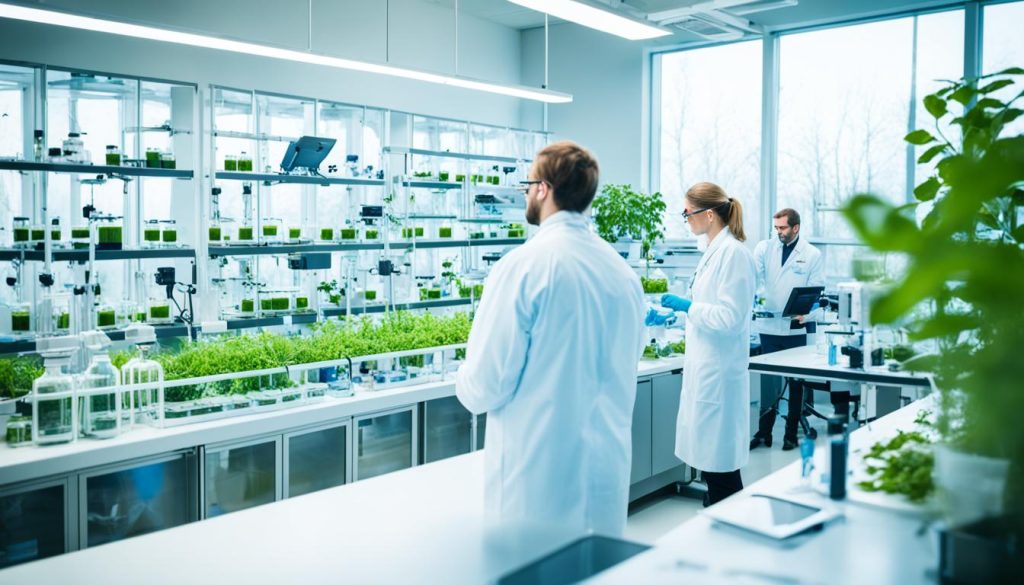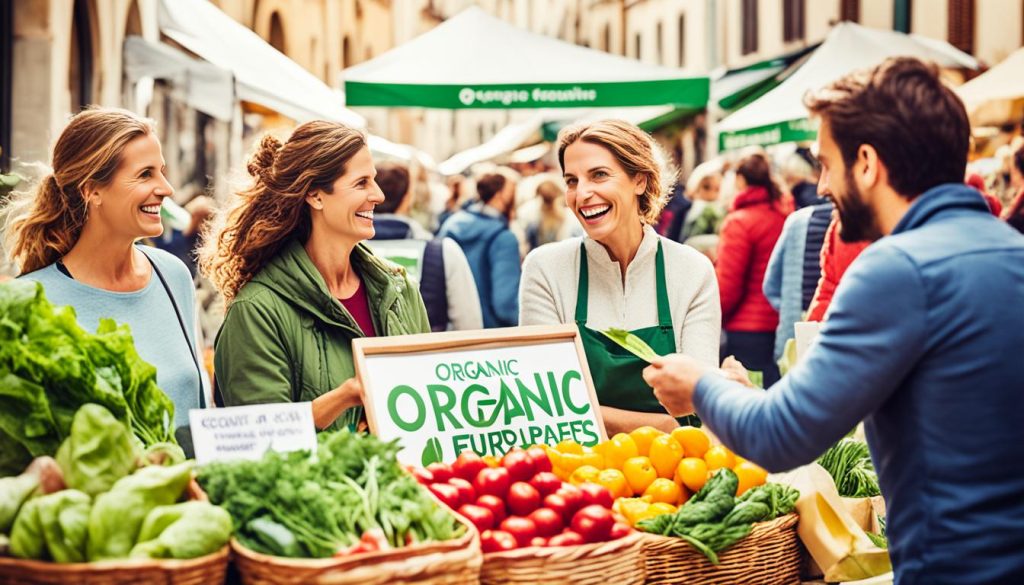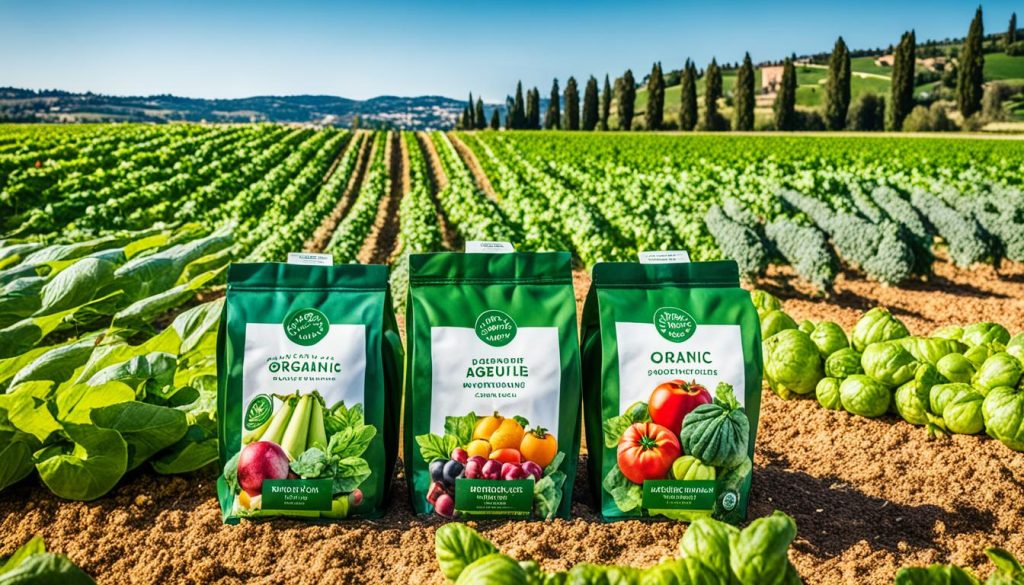Italy is leading the way in making organic products. It’s doing this by mixing new ideas with old farming ways. We’ll look at why Italy is a top player in the organic market and how it’s making a difference in sustainable farming.
Key Takeaways
- Italy is a pioneer in organic products innovation, blending innovative techniques with traditional farming practices.
- The country’s rich agricultural traditions and diverse regions contribute to its success in organic farming.
- The Italian government provides substantial support and regulations to promote organic agriculture.
- Farmers and scientists collaborate closely to develop cutting-edge techniques and research in organic farming.
- Italy’s organic excellence extends beyond food, encompassing sectors such as wine, beauty, and fashion.
A Rich Tradition of Organic Farming
Italy is famous for its beautiful landscapes and vibrant food scene. It also has a long history of organic farming. For years, Italian farmers have focused on sustainable farming. They care for the land and make sure their food is of the highest quality.
This tradition comes from a love for natural and healthy food. In Italy, eating food from the farm to your table is a way of life. Organic farming here is more than just a label. It’s about looking after the environment and supporting local communities.
Italy’s organic farming has led to new innovations. By mixing old farming ways with new technology, farmers have found a great balance. This approach ensures their produce is sustainable and top quality.
Biodiversity is key in Italian organic farming. Farmers keep their farms diverse to control pests naturally and keep the soil rich. They grow many crops and rotate them to keep their farms strong and healthy.
Italian farmers also use natural fertilizers and traditional seeds that are not genetically modified. They know that healthy soil is crucial for growing good crops. So, they focus on making their soil fertile and sustainable.
Preserving Heritage Varieties
Italy’s organic farming also means saving heritage varieties of crops. These crops have been around for generations and are important to Italy’s farming history.
By keeping these crops, farmers protect their cultural heritage. They also make sure there’s a wide range of organic products for consumers. This lets people enjoy the unique tastes and qualities of these heirloom crops.
In conclusion, Italy’s long history of organic farming has helped it lead in the organic products industry. By combining old and new farming methods, Italian farmers have created a system that values the land and their farming heritage.
Government Support and Regulations
Italy is deeply committed to organic products innovation. This is thanks to strong government support and detailed regulations. These efforts have been key in promoting and overseeing organic farming across the country.
The Italian government offers various incentives to encourage farmers to go organic. Through grants and subsidies, it helps farmers switch from traditional to organic farming. This support not only aids the environment but also boosts farmers’ economic success.
Italy also has strict rules and certification standards for organic products. These rules make sure organic farming meets high standards. This ensures the quality and integrity of organic products in the market.
The government backs research and development in organic farming too. It works with research bodies and farmers to share knowledge and innovate. This helps the organic sector grow.
Italy is also part of global efforts in organic farming. It works with other countries to share best practices. This helps Italy’s organic farming meet global standards, building trust with consumers.
The Role of Certifications
Certifications are very important in Italy to make sure organic products are genuine and traceable. Bodies like Bioagricert and ICEA check that farmers and producers follow organic rules.
Certifications give buyers peace of mind that the organic products they buy are up to standard. They go through strict checks and tests. The European organic logo on products is a clear sign of their authenticity.
With strong government support and strict certification, Italy leads in organic farming and innovation. These efforts have made a great environment for organic products. They have boosted demand and helped the sector grow.
Incentives for Organic Farming
| Incentive | Description |
|---|---|
| Funding Grants | The government provides financial support to farmers transitioning to organic farming, assisting with infrastructure development and operational costs. |
| Subsidies | Subsidies are offered to organic farmers to compensate for the higher costs associated with organic farming practices. |
| Tax Incentives | Organic farmers benefit from tax incentives, reducing their burden and promoting growth in the sector. |
| Research Funding | Investment in research and development ensures continuous innovation and improvement of organic farming practices. |
Embracing Innovative Techniques

Italy is leading the way in organic farming with innovative techniques. These methods boost productivity, sustainability, and quality. Farmers and producers are using new methods to change the organic farming scene.
One big change is precision agriculture. It uses sensors, drones, and data to manage things like water, fertilizers, and pests. This way, farmers use resources better and protect the environment. It leads to better crops and lower costs.
Vertical farming is another big idea in Italy. It grows crops in stacked layers in controlled spaces. This method uses less water and light and cuts down on pesticides. It lets farmers grow crops all year, increases yields, and protects nature.
Italian farmers also use biocontrol methods instead of chemical pesticides. They bring in natural predators or use biopesticides. This helps control pests and diseases without harming the environment or wildlife.
RossoAntico Farms is a great example of using innovative techniques. They’ve boosted productivity with precision agriculture and vertical farming. Their success shows how these methods can work well together.
Italian organic farmers are all about improving and advancing sustainable farming. They lead in technology and new methods. This helps the organic farming industry grow and makes our food system more sustainable.
Regional Diversity in Organic Production
Italy’s organic farming sector thrives on its regional diversity. Each region has its own unique conditions that make it perfect for certain organic products. This variety shows Italy’s skill in organic farming.
Let’s look at some Italian regions famous for their organic produce:
The Tuscan Hills:
Tuscany is known for its beautiful views and organic vineyards and olive groves. Its mild climate and rich soil are ideal for growing top-quality organic wines and olive oil.
The Alpine Foothills:
In Trentino-Alto Adige, the Alpine foothills are perfect for organic apples. The crisp air and mineral-rich soil make the apples taste exceptional.
Sicilian Citrus Groves:
Sicily, at Italy’s southern tip, has a warm Mediterranean climate. This makes it great for growing organic citrus fruits. The region is famous for its oranges, lemons, and mandarins, known for their bright flavors.
The Po Valley:
The Po Valley in northern Italy is famous for its organic rice. The area’s water-rich soil and traditional farming methods produce top-quality organic rice. This rice is a key ingredient in Italy’s famous risottos.
Puglia’s Olive Groves:
Puglia, in southern Italy, has vast olive groves that produce some of Italy’s best organic olive oil. The region’s warm climate and long history of olive farming make it a key place for organic olive oil.
These examples show the variety in Italy’s organic production. The right climates, fertile soils, and long farming traditions lead to a wide range of organic products. This highlights Italy’s dedication to sustainable and quality farming.
Collaboration between Farmers and Scientists
In Italy, farmers and scientists work together to improve sustainable agriculture. This partnership has led to new ways of farming organically. They’ve made crops more diverse and farming methods greener.
Farmers share their knowledge of the land with scientists. Scientists bring their research and tech skills. Together, they’ve made big steps forward in organic farming in Italy.
They’ve made a big impact on pest control. By working together, they’ve cut down on harmful pesticides. They’ve found new ways to fight pests that are good for the planet.
This team has also brought in new farming methods like cover cropping and precision farming. These methods help the soil and crops. They make crops stronger and produce more food.
They’ve also tried out different crops. This has helped keep old farming ways alive. It also gives consumers more organic food choices.
This partnership shows how sharing knowledge can lead to big changes. Italy is now a top place for organic innovation. Farmers and scientists will keep working together to grow the organic market worldwide.
Cutting-Edge Research and Development

Italy is leading the way in organic farming, going beyond traditional methods. The focus on research and development is key to innovation and pushing organic farming forward.
Italian research institutes and universities are leading the charge with groundbreaking projects. They work on new techniques and sustainable solutions for organic farming. This helps farmers overcome the challenges they face.
Collaboration for Organic Advancement
Research teams work with farmers, experts, and government to make sure their work is useful. This teamwork brings together different fields to share knowledge and improve constantly.
Innovative Projects and Initiatives
Italy’s research covers many areas in organic farming. Some key projects include:
- Exploring sustainable pest control methods to reduce synthetic pesticides
- Developing new organic fertilization and soil management techniques
- Looking into alternative energy sources for farms
- Advancing precision farming technologies for better resource use
Scientific Breakthroughs
Italy’s research has led to big scientific discoveries that help not just local farming but organic farming worldwide. These discoveries include:
- Natural biocontrol agents to fight pests and diseases
- Beneficial microorganisms that boost plant health and productivity
- New methods for organic weed control
Sharing Knowledge and Expertise
Italy shares its research at international events to spread knowledge globally. This sharing helps farmers, researchers, and policymakers worldwide access the latest in organic farming.
| Benefits of Cutting-Edge Research and Development in Organic Agriculture |
|---|
| Enhanced crop yields and productivity |
| Improved resource efficiency and sustainability |
| Reduced environmental impact |
| Innovative solutions for organic farming challenges |
Organic Products in Italy’s Culinary Tradition
Italian cuisine is famous for its quality and true taste. The use of organic products is a big reason why Italian food is so good for you. Italy values organic farming, which means they use top-quality ingredients that are good for the planet and for health.
Organic farming in Italy goes back a long time. Farmers there have always cared for the land and used traditional ways of farming. They avoid harmful chemicals and genetically modified foods. This makes sure the food is pure and true to its roots.
Italy loves to use organic products from its own land. Chefs choose ingredients that are grown or raised in a way that’s good for nature. This helps the local farmers and food makers. It also connects the land with the food on our tables, which is good for us and the planet.
Italian food lets the real taste of organic ingredients shine. Organic tomatoes make a marinara sauce rich and full of flavour. Organic basil adds a sweet touch to a Caprese salad. These ingredients make Italian dishes special and loved by food lovers everywhere.
Restaurants in Italy also focus on organic products. They show off the best of Italian food with their menus. This not only gives us tasty and healthy meals but also helps the local farmers and supports green farming.
The Organic Farm-to-Table Movement
Italy is all in with the farm-to-table movement. It’s about connecting farmers and consumers directly. This way, organic food is easy to get and supports sustainable farming.
The farm-to-table idea also brings people to farms through agriturismo. Visitors can see how organic farming and traditional cooking happen. It’s a great way to learn about Italian food and the effort put into making it.
Organic Products in Italian Recipes
| Dish | Key Organic Ingredients |
|---|---|
| Pesto Genovese | Organic basil, pine nuts, Parmesan cheese, extra virgin olive oil |
| Carbonara | Organic eggs, organic pancetta, Parmesan cheese, black pepper |
| Bruschetta | Organic tomatoes, organic garlic, organic basil, extra virgin olive oil |
| Tiramisu | Organic eggs, organic coffee, organic cocoa powder |
Italian recipes are simple but focus on the best ingredients. Here are some classic dishes that use organic products:
Exporting Italian Organic Excellence
Italy is a leader in organic farming and innovative agriculture. This has led to the creation of top-quality organic products. These products have won praise at home and abroad.
Italian organic exports are booming. They show off the country’s organic excellence worldwide. Brands from Italy are making their mark globally, sharing Italy’s organic traditions and skills.
Italian organic brands focus on being true to their values and quality. They ensure their products are organic from start to finish. This honesty has helped them succeed in the export market.
Italy’s diverse agriculture helps its organic exports too. Each region grows different organic crops. This means a wide range of unique products for consumers everywhere.
Italy has strong trade links to help its organic products reach new markets. These partnerships with importers and retailers make sure Italian organic goods are available worldwide.
Italian Organic Products Abroad
Italian organic products are making waves globally. Take organic olive oil, for example. Italy is famous for its olive oils, and the organic ones are especially popular for their quality and health benefits.
Here are some top Italian organic products exported worldwide:
| Product | Export Destinations |
|---|---|
| Organic Wine | United States, United Kingdom, Germany, Switzerland |
| Organic Pasta | United States, United Kingdom, Australia, Japan |
| Organic Cheese | France, United States, United Kingdom, Germany |
| Organic Coffee | United States, Germany, Switzerland, Japan |
| Organic Honey | United States, United Kingdom, Germany, China |
Italian organic wine is a big hit, loved for its taste and quality. It’s shipped to many countries, enjoyed by those who love Italy’s wine culture.
Italian organic beauty products are also popular. Brands like Giorgio Armani Beauty and KIKO Milano offer organic beauty options globally.
Exporting Italian organic products has boosted Italy’s economy and its reputation for organic excellence. It shows Italy’s dedication to sustainable farming.
The Future of Italian Organic Exports
The demand for organic products is growing, so Italian organic exports are set to do well. Italy’s farming traditions and innovative methods make it a key player in the global organic market.
Italian organic brands are always improving, meeting new consumer needs. This keeps their products in high demand worldwide.
In conclusion, exporting Italian organic products has been a huge success. It highlights Italy’s commitment to sustainable farming. Now, people all over the world can enjoy Italy’s organic heritage.
Organic Wine Industry
Italy leads the organic wine industry, known for its commitment to sustainable practices and top-quality wines. It combines traditional winemaking with modern innovations. This creates a thriving sector focused on the environment and producing premium wines.
Organic vineyards in Italy follow strict rules, avoiding synthetic pesticides and fertilizers. They use natural methods to protect soil health and biodiversity. This approach helps the agriculture industry and makes healthier, tastier wines.
Italian organic wines show off the country’s diverse landscapes and climates. From Tuscany’s hills to Sicily’s vineyards, each region adds unique flavors and aromas. This variety highlights Italy’s rich winemaking history and its focus on terroir.
These wines are known worldwide for their quality and taste. Wine lovers everywhere value their sustainable production and the premium quality. As people become more aware of environmental impact, they choose organic wines that match their values.
| Benefits of Italian Organic Wines | Characteristics | Regions of Production |
|---|---|---|
| 1. Made from organically grown grapes | 1. Unique terroir-driven flavors and aromas | 1. Tuscany |
| 2. Free from synthetic pesticides, herbicides, and fertilizers | 2. Balanced acidity and tannins | 2. Piedmont |
| 3. Environmentally sustainable production practices | 3. Elegant and complex profiles | 3. Veneto |
| 4. Support for biodiversity and soil health | 4. Lingering finishes and refined textures | 4. Sicily |
Italian wineries are always innovating in the organic wine industry. They use the latest research to improve sustainability and wine quality. This keeps Italian organic wines leading the global market, pleasing wine lovers and protecting the environment.
Italy’s Organic Beauty and Fashion Sector
Italy goes beyond just organic food and drinks. It’s also big on organic beauty and fashion. Now, we see new organic skincare brands and sustainable fashion labels popping up. They meet the growing demand from consumers.
In the beauty sector, Italian brands use natural ingredients for a wide range of organic products. They use Italy’s natural resources like olive oil, lavender, and citrus. This creates skincare that’s effective yet gentle. People looking for organic options can find everything from creams to cleansers that are good for their skin and the planet.
Italian fashion is also focusing on sustainability in the fashion sector. Fast fashion has been bad for the environment. So, there’s a big push for eco-friendly and organic fashion now. Italian fashion brands are using sustainable materials and ethical production methods. They’re also cutting down on their carbon footprint.
Italian fashion isn’t just about organic fabrics like cotton and linen. They’re also using recycled fibers, plant-based dyes, and low-impact processes. This means people can look good without hurting the planet.
Italy’s beauty and fashion aren’t just for the local market. They’re also loved around the world. The mix of Italian craftsmanship, quality, and sustainability makes their organic products very popular.
| Benefits of Italy’s Organic Beauty and Fashion Sector | Impact on Consumers |
|---|---|
| 1. Nurtures the skin with natural and organic ingredients | – Healthier skincare routine – Reduced exposure to harmful chemicals |
| 2. Promotes sustainable and ethical fashion practices | – Reduces environmental impact – Supports transparent supply chains |
| 3. Provides stylish and high-quality organic products | – Fashion-forward choices – Durability and longevity |
| 4. Showcases Italy’s rich cultural heritage in beauty and fashion | – Connects consumers with Italian traditions – Reflects a commitment to excellence |
Italy’s organic beauty and fashion show its commitment to being sustainable and innovative. They’re keeping their rich culture alive. As people think more about the environment, Italian brands are leading with organic options. These products are stylish, quality, and ethical.
The Future of Italy’s Organic Products Innovation
Italy is leading the way in the organic products industry. It has a rich farming history and a focus on sustainable practices. Looking ahead, several trends will shape Italy’s organic future.
1. Technological Advancements
Technology will be key in Italy’s organic innovation. Precision farming and data analytics will help farmers. These tools will increase yields and cut down on synthetic inputs.
Smart farming solutions will boost productivity, lower costs, and make farming more sustainable.
2. Rising Consumer Demand
More people want organic products, not just in Italy but worldwide. This is because they care about their health and the planet. This trend offers a big chance for Italian producers to grow and innovate.
3. Sustainability and Regenerative Agriculture
With climate change and environmental issues, sustainable farming is more important than ever. Italian farmers are using methods like crop rotation and natural pest control. These methods improve soil health and biodiversity.
They also lead to better organic products.
4. Diversification and Product Development
The organic market is changing, and staying ahead means diversifying and developing new products. Italian producers are trying new crops and processing methods. This keeps Italy at the forefront of organic innovation.
5. Collaboration and Knowledge Exchange
Working together is key to Italy’s organic future. Farmers, scientists, and experts sharing knowledge will drive progress. This teamwork will lead to new discoveries and sustainable growth.
Italy’s organic future looks bright. It has a strong tradition, government support, and cutting-edge research. Italy is set to lead the global organic market.
| Key Factors Shaping the Future of Italy’s Organic Products Innovation | Impact |
|---|---|
| Technological Advancements | Enhanced productivity, reduced costs, and improved sustainability |
| Rising Consumer Demand | Market expansion and introduction of new organic products |
| Sustainability and Regenerative Agriculture | Improved soil health, biodiversity, and environmental sustainability |
| Diversification and Product Development | Staying competitive and catering to changing consumer preferences |
| Collaboration and Knowledge Exchange | Collective advancements and overcoming sector challenges |
Consumer Awareness and Demand

Italy’s organic products are getting more popular thanks to growing consumer awareness and demand. People now want to know how their choices affect their health and the planet. They look for organic options in their everyday lives.
The Growing Trend of Conscious Consumerism
More people know about the dangers of synthetic chemicals and pesticides in regular farming. This has made them choose organic products. They’re ready to spend more for items that are safe from harmful substances.
Transparency and Certifications
Customers want to know the truth about where their food comes from and how it’s made. This need for clarity has boosted the use of certifications and labels. These labels prove a product is organic.
Certifications like the EU Organic Label and the Italian Organic Food Consortium are well-known. They make sure products are up to organic standards.
Shaping the Organic Market
The demand for organic goods has made the organic market in Italy strong. Both producers and retailers are offering more organic products. Now, from big supermarkets to local markets, there are many organic choices available.
People’s growing awareness of health, the environment, and ethics is changing the organic products industry in Italy. As they keep focusing on their health and a greener future, the need for organic products will likely go up. This will open new chances for innovation and growth in the organic sector.
Conclusion
Italy leads in organic products innovation, thanks to its deep organic farming tradition. The country has strong government support and rules for organic farming. It also uses new techniques and values regional diversity in organic production.
Italy works closely with farmers and scientists, pushing the boundaries of organic farming. This has made Italy a leader in the global organic market. The country is committed to sustainable farming and organic excellence.
Italy’s focus on quality and authenticity goes beyond food. Its organic wine and beauty and fashion sectors are thriving. By using its natural resources and traditional skills, Italy has made a mark in the global market. It meets the demand for sustainable organic products.
Italy’s future in organic innovation looks bright. This is thanks to growing consumer interest, government backing, and teamwork in the industry. With its strong organic sector, Italy is set to lead in setting new trends and inspiring innovation. It will help the world move towards a sustainable and eco-friendly future.
















